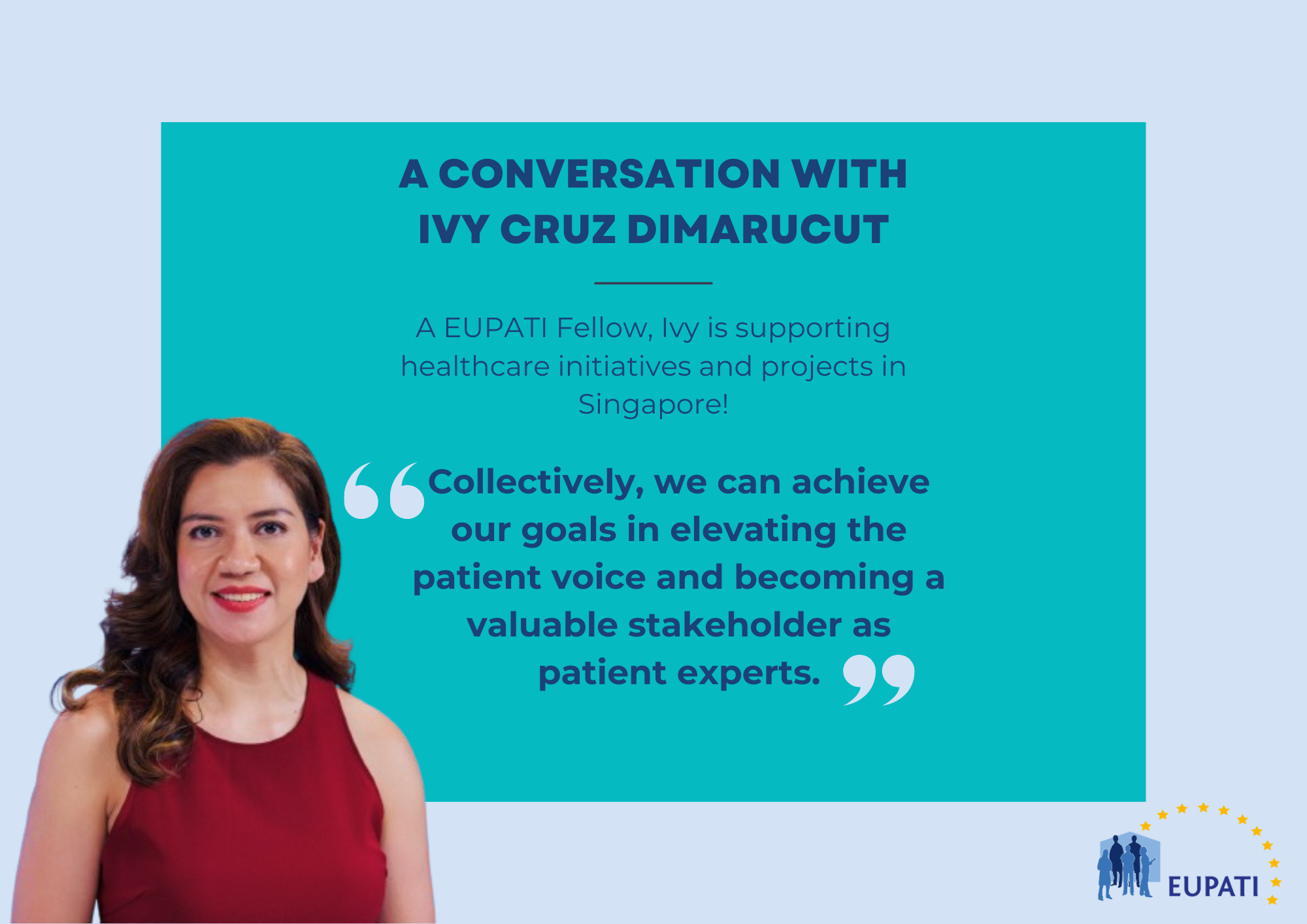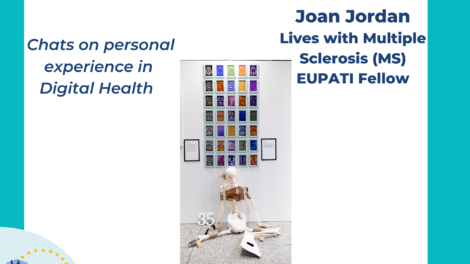
After a health scare back in 2010, Ivy Cruz Dimarucut decided to relocate to Singapore. Fondly dubbed as the “Little Red Dot” due to its small size on the maps, Singapore is known in the world for its well-trained clinicians and advanced medical facilities. For the last decade, she has been supporting the country’s healthcare initiatives and projects within her work and as a volunteer, and has also taken part in Cohort 6 of EUPATI’s Patient Expert Training Programme. Through her words, she reflects fondly on her experience, but also on her personal and professional journey as a patient advocate.
Could you share your story with us?
My breast cancer scare back in 2010 made me decide to relocate to Singapore. While I have not had the personal experience of living with a disease, I have been, for over a decade supporting Singapore healthcare initiatives and projects in the work that I do and as a volunteer. Presently, I am a senior legal counsel for an organisation in the clinical research space in Singapore that unites national R&D and clinical translation programmes to boost Singapore’s clinical research and innovative capabilities. Being a EUPATI Fellow opened my eyes to this world of possibilities of elevating patient engagement in the entire healthcare landscape.
How did you hear about the EUPATI Patient Expert Training Programme?
Two years ago, I was invited by a clinical research academy to give a short lecture to clinical research coordinators about clinical research agreements and insurance. Skilled coordinators are key to conducting high-quality clinical research and developing a well-trained coordinator talent pool is vital for Singapore to remain a leader in healthcare innovation and a top choice for clinical trials.
To prepare for the lecture, I looked around for courses on clinical research and drug development. True story – one course provider refused to accept my application for lack of background in science! Then I stumbled upon the EUPATI Patient Expert Training Programme; I signified my intention of joining the course and I was accepted. After completing all modules and the assessments, the virtual learning sessions, and in-person training, I graduated as a EUPATI Fellow part of cohort 6 in October 2023 in the beautiful city of Prague, joining the EUPATI family.
What made you want to join this programme?
While I had wanted to join the EUPATI Patient Expert Training Programme in preparation for my lecture for the clinical research coordinators and also to upskill myself so I can better support my organisation, I was mindful of my fulltime work and that it would be crucial for me to strike that good balance between work and the training programme.
Luck was on my side that EUPATI offered a flexible learning pathway for trainees; the medium of instruction was English; it’s in an open classroom format, which was easy to navigate; contents were free to access and the trainees just need to pay a fee for the module certificates. The roster of lecturers and trainers was a nice mix of people from EMA, regulatory bodies, patient organisations, and industry partners. I knew back then I would benefit greatly from this training programme and EUPATI simply exceeded my expectations.
Were there any challenges being part of this programme whilst living in Singapore?
Balancing full-time work and the programme was no easy task and I did not wish for either to be compromised in any way. We had target dates for when to complete and pass the assessments and virtual sessions where I had to stay back at the office after work and hurry to my classes that lasted until 1 in the morning!
Can you share a core memory / experience you’ve had since joining EUPATI?
The graduation ceremony in Prague in 2023 was a memorable event having met such passionate people from different parts of the world, uniting under a shared vision of enhancing and elevating the patient’s voice through education and empowerment, aiming to improve health outcomes with the input of patients and patient representatives and advocates as essential stakeholders.
One might think that we are brought together by our different illnesses and conditions; au contraire, our collective strength and mutual support have connected us together. The openness to share our personal stories, the hurdles, the frustrations, as well as the achievements in our efforts to get the patient’s voice heard was just amazing and truly inspiring, impressing upon ourselves the importance of patient and patient representative engagement.
Do you have any advice for people looking to join this programme?
With healthcare research and projects increasingly recognising the value that patient engagement brings to the table, the whole of patient community needs to collectively understand that we have to up our game and to ready ourselves for when we will be engaged as valuable stakeholders to share our lived experiences and perspectives.
One effective way is to get the relevant training and certification. EUPATI offers an open learning platform that is user friendly, and the contents of each module are couched in layperson’s language so they are easy to comprehend. For questions or clarification, there are dedicated point persons to assist and response time, in my experience is prompt and on point
Enroll in the programme to get a clearer grasp of how one can take an active involvement in relevant parts of the research process. EUPATI is also a rich avenue to meet like-minded individuals and expand your network reach.
How has this experience translated into your current work?
One tangible benefit of being a EUPATI Fellow is the wonderful connections you can make, realising that sharing the same vision and moving in the same direction, we can be this close to making patient engagement the norm, steering away from patient involvement as a mere token. Some may even say that patient engagement is
non-negotiable; that’s how high regards are being placed for meaningful engagement of patients, patient representatives, and advocates in the healthcare landscape. There is so much to learn from other jurisdictions such as the EU and the US, realising you can offer your support not just to your own patient group but to the broader patient community in ways you can.
For two years now, I have been supporting some patient organisation for families whose children have SYNGAP1 mutation, raising awareness and advocating for SYNGAP and supporting the families with children with disabilities. If I may borrow their tagline: “together, we are strong.”
To further deepen my knowledge and understanding in the area of patient advocacy at the international level, I am currently pursuing II level University Master Course in International Patient Advocacy Management (IPAM) at the Università Cattolica del Sacro Cuore in Italy. IPAM is designed to equip us with the necessary management skills for effective coordination and development of patient organisations’ activities within the healthcare context.
Last year, I was very fortunate to have been invited to serve in the board of directors of APOS – the Alliance of Patients’ Organisations Singapore. As a EUPATI Fellow, I have volunteered my expertise to support this wonderful initiative to bring together over a hundred patient groups in Singapore. APOS aims to empower patient groups, advocate for patient-centric policies, enhance patient engagement, provide accessible education, and foster collaborations and partnerships.
We have commenced discussions around exploring the possibility of setting up a EUPATI national platform in Singapore, which will benefit the entire patient community. Patients themselves have their individual disease experiences they share with their families, peers, and patient groups, which when coupled with the proper patient education, will make them valuable stakeholders who can play an active role in relevant points across the drug development lifecycle, including medical device planning and rollout, HTA, and other post-marketing and post-approval activities. Evidently, we can play this crucial role as patient experts.
Any final reflections you’d like to share?
It is very easy to feel that you are just a tiny cog in this huge healthcare landscape but equipping yourself with the proper training, forging meaningful partnerships, and expanding your networks with the same mission, and moving towards the same direction, one can create an impactful contribution and collectively we can achieve our goals in elevating the patient voice and becoming a valuable stakeholder as patient experts.
This will ensure that researchers are asking the right questions and getting the right answers from the patients’ perspectives, preferences, and lived experiences and to look not just on the efficacy of the drugs but give proper attention to the patients’ quality of life of which the patients living with the disease are the experts to tell their experiences.
As one African proverb says: “If you want to go fast, go alone. If you want to go far, let’s go together.”
Date posted: April 29, 2024
Categories: Testimonials



